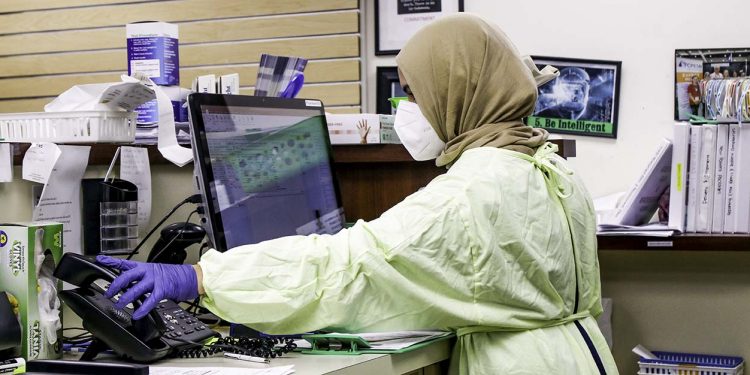Politicians and opinion leaders have made the pros and cons for wearing the Muslim headscarf when employed in uniformed public services in Singapore abundantly clear in Parliament and the media, as well as online. But these voices have been predominantly male. And since Muslim women have been infrequently heard in public on an issue that directly affects them personally and professionally, in the coming weeks, TheHomeGround Asia flips the gender switch to hear what some of them have to say.
Today, we give the floor to Nur and Anna of Lepak Conversations.
Unless you have been living under a rock for the past 10 years or more, you would likely have heard or read about the ongoing debates and discussions around the ‘ban’ on Muslim women wearing the religious veil (tudung or hijab) in certain uniformed public service jobs, such as nursing, the police force and the armed forces.
In the latest development on this matter, Singapore Law and Home Affairs Minister K Shanmugam said on 23 March that the Government will likely change its stance on nurses donning the tudung, and would announce its decision in a few months, after consulting with the community.
Dialogue around removing the ‘ban’ on Muslim women wearing the tudung in uniformed jobs are manyfold, often fraught, and lest the public forgets, as Singapore’s political and religious leaders consistently remind us, “delicate”, “sensitive” and “best discussed behind closed doors”.
But despite these potential minefields and warnings of the impact on religious harmony, conversations are being held openly online among netizens, and offline between friends, family members and colleagues.
In the case of Lepak Conversations, this issue has been one of several hot button topics tackled with passion and conviction on its Instagram page. Started last July by a pair of then 22-year-olds, Nur and Anna, a law student and graphic designer, respectively, @lepakconversations aims to empower the Malay/Muslim community by “raising awareness on Malay/Muslim issues through respectful discussion, and advancing allyship.”
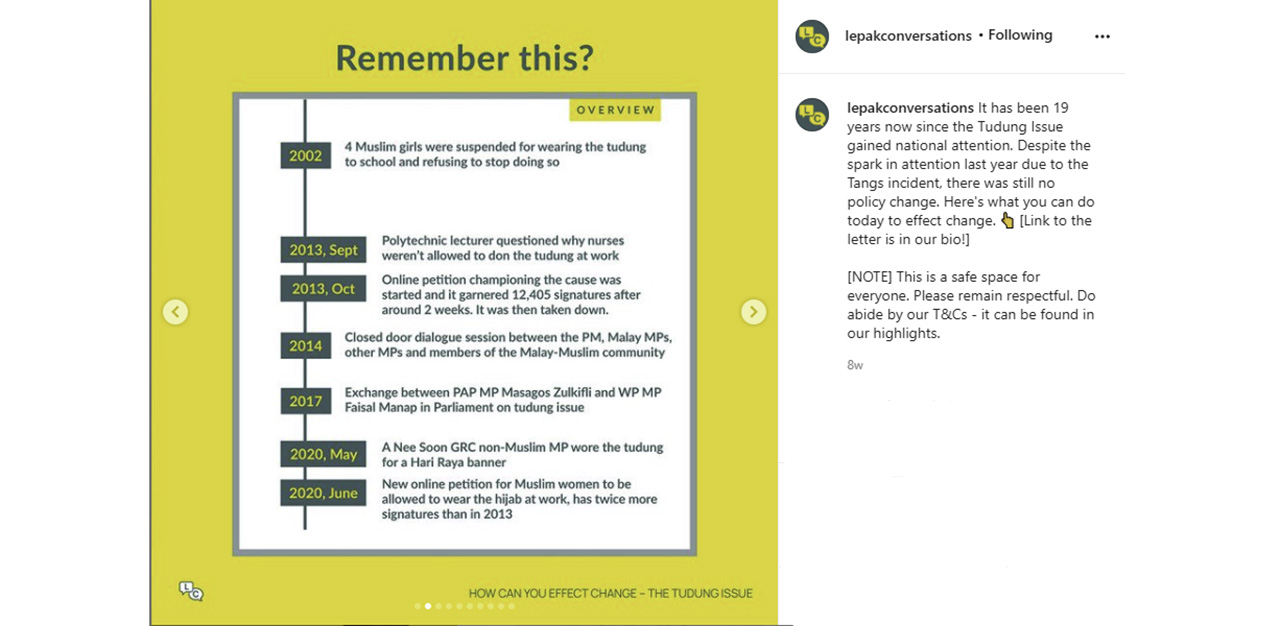
‘Lepak’, meaning to “relax, hang out or chill out by doing nothing” in Malay, embodies Nur and Anna’s resolve to build a safe space online where sensitive or controversial issues might be tackled with calm and empathy.
Say Nur and Anna in writing: “Lepak Conversations was started when we noticed a gap in public discourse surrounding Malay/Muslim issues…[It] aims to educate the Malay/Muslim and non-Muslim community on the issues that plague the Malay/Muslim community and how we can overcome them together.”
With more than 5,000 followers, the platform has grown significantly in nine months, reflecting a hunger among internet users for avenues to listen to and learn about, as well as to advocate for issues that affect minority communities in Singapore. Besides regular posts on social media, Lepak Conversations has also held focus group discussions with the community on five main topics, including the tudung, cultural appropriation and domestic violence.
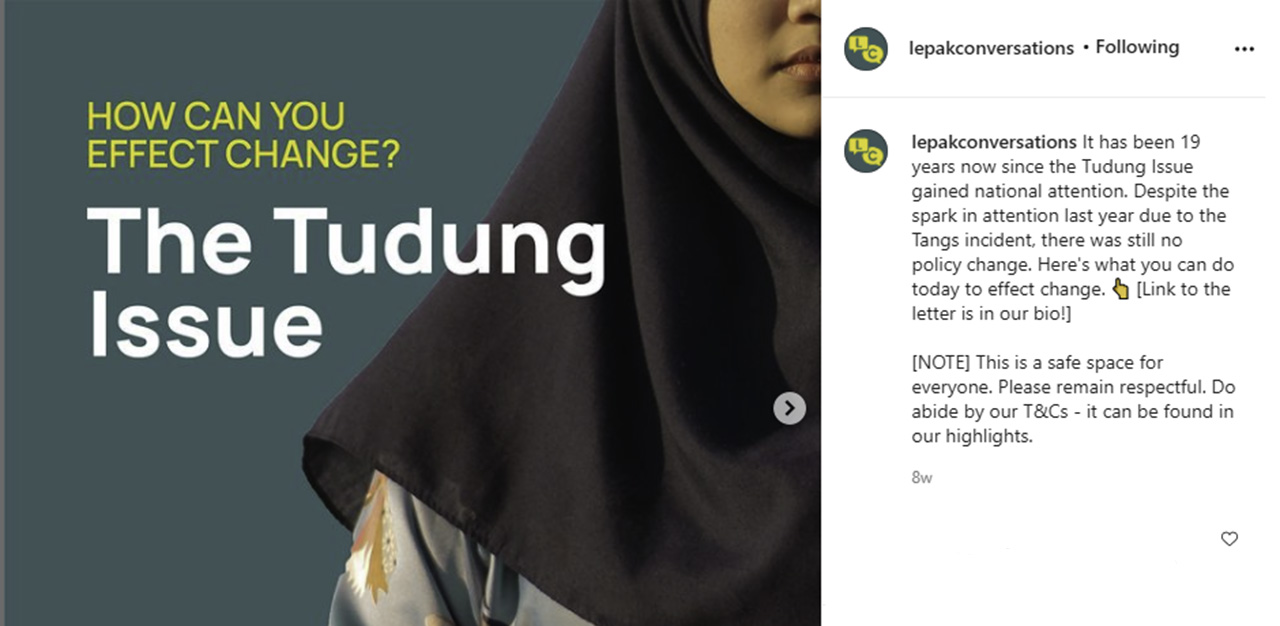
Last year, it asked its community to share their lived struggles of discrimination for wearing the tudung. They received many accounts from women, including those who were asked to remove their tudung if they wanted to secure or keep their jobs (including non-uniformed and non-customer-facing ones), also of being told they were “less approachable”, “showed biasness” and even “scaring customers” with the hijab, or becoming afraid that their hijab would not be acceptable when applying for jobs, resulting in them losing self-confidence. Some continued to be judged even when not wearing the tudung, because of the colour of their skin.
Nur and Anna share, “Through Lepak Conversations, many women, of all ages and professions, have reached out to us to share their experiences on how the tudung ban has limited their job opportunities. Despite the policy being limited to uniform service, many women in the private sector or even ad-hoc part time jobs like warehouse packing have been denied the role simply because of their tudung, without a clear justification for such a decision.”
Given how many biases and misperceptions continue to circulate in society, at the crux of their mission, Nur and Anna simply want to strengthen religious and racial harmony in Singapore. And they believe that to achieve this requires fostering understanding amongst the different racial and religious groups in Singapore. They think that this will “create an acceptance of these groups’ practices and beliefs, rather than mere tolerance.”
Here are some of their thoughts around various aspects of the tudung issue.
(Note: The interview has been edited for clarity and length.)

On the ‘ban’ on wearing the tudung in uniformed public services
Lepak Conversations: As tudung-wearing women ourselves, who are both in professions which allow us to don the tudung, we feel disappointed that our fellow Muslim females are not accorded the same rights. We feel frustrated too as the Government has not provided good reasons for allowing the ban.
Furthermore, apart from the Government’s position on the ban, the legitimacy of this policy does not stem from any laws or the Constitution. (Presently there is no legislation or article in the Constitution which explicitly prohibits the wearing of the tudung in these public sector frontline positions) While nobody is entitled to absolute rights, we do think the Government should clarify this matter. While a law’s constitutionality can be challenged in court, there seems to be no recourse for those who wish to challenge this policy legally. Past public discourse on the matter has been ineffective in changing the Government’s stance on the ban.
On closed-door discussions
Lepak Conversations: We understand, and agree, that matters of racial or religious significance are sensitive in nature, thus the Government has chosen to hold closed-door discussions on the tudung issue.
However, we do believe that there is much value in holding open discussions with members of the public (Muslims and non-Muslims) so both sides can voice their concern, and these conversations can be centred around respect and mutual understanding. The Government needs to rise to the challenge and take the lead on this matter. It is hard but we think it is possible and necessary.
On the importance of consulting Muslim women
Lepak Conversations: To our knowledge Malay/Muslim Members of Parliament (MP) and Muslim female religious figures have been consulted behind closed doors. However, to our knowledge, the everyday Muslim women who are affected by this ban have not been consulted unless they have personally reached out to their MP to share their views.
We do not know why our female Muslim MPs have not publicly spoken about the matter, so we shall not speculate. But we are of the view that minority representation in Parliament, and female representation, is for the purpose of ensuring that minority concerns, and women’s concerns, are voiced and heard in Parliament. So, it is disappointing that our female MPs have not spoken out about it.
It is important to hear from the women who are affected by the ban and understand their lived realities. This is a complex issue that is linked not only to race or religion but also to gender, class, personal identity, and socio-economic background.
The tudung is a religious garment that is only worn by women, exacerbating the workplace discrimination that women already face. The issue does not directly affect Muslim men. Thus, we see this as an issue that is linked to gender, in terms of personal identity, there is a growing number of Muslim women who believe that it is their personal choice to don the tudung and how they should do so. Thus, there is an element of personal identity and choice when it comes to this issue. As there is a diverse group of Muslim women’s voices on class and socioeconomic background, it affects the opportunities that are accorded to these women at the workplace.
You may refer to this [2017] study for details on this Voices behind the veil: Unravelling the hijab debate in Singapore through the lived experiences of hijab-wearing Malay/Muslim women [by authors] Humairah Zainal & George Wong.
On this being a wider community issue around social harmony, rather than only a Malay/Muslim issue
Lepak Conversations: In our opinion, it should be more than a Malay/Muslim issue. This is an issue that affects women, with factors like class, socio-economic background, and gender linked to it. We think that by framing it as a gender issue, the tudung issue can be included in more discussions about women’s issues. And women’s issues are often viewed as a national issue where everyone has a collective responsibility to be more inclusive of women and treat them fairly.
Furthermore, even if a certain issue does not affect an individual, it is always important to lend their voices and help. We do not leave the disadvantaged or those who are treated unfairly to fend for themselves. Allyship is so important. Active citizenry should definitely extend beyond issues that affect oneself.
To us, at the core of the tudung issue is choice and how Muslim women have been deprived of making their own choices on donning the tudung. Since the tudung does not encroach on others’ freedom or safety, if a person believes that women should have the choice to decide what to wear and how to live their lives, they should support the donning of the tudung at the workplace.
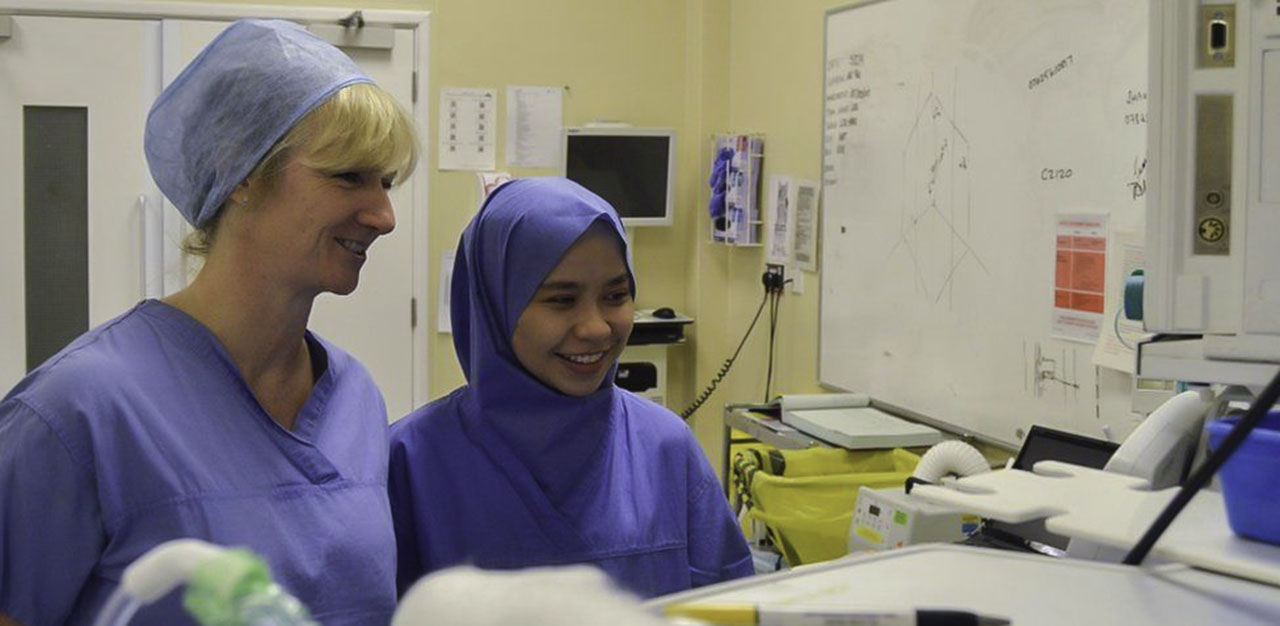
On the ‘ban’ being lifted in the nursing sector
Lepak Conversations: Firstly, we feel hopeful. We do hope that tudung-wearing women will see change after decades of waiting. However, we are disappointed with the circumstances in which the announcement was made. As part of the announcement, there were discussions about how the Muslim community have “misunderstood” the Government or do not understand the sensitive nature of the issue. To us, these statements added salt to our wounds.
Most people in the community understand that this is not an easy issue for the Government to deal with and that matter of religion and race can be sensitive. We do not understand the approach the Government has chosen to take on the matter. We understand that there are concerns surrounding the misinterpretation of what has been said by the Government, but this is something that the people and the Government can work on together. Since the Government has several open channels for the public to raise their concerns and clarifications, we believe a civil conversation can be held between the Government and the community.
On potential repercussions if the ‘ban’ is lifted for Muslim nurses
Lepak Conversations: As for repercussions, we acknowledge that unfortunately, some people may discriminate against tudung-wearing women at the workplace. However, we do already have guidelines and laws in place for those who abuse public servants as a form of deterrent. More importantly, and to us a better approach, would be to educate the public on the significance of the tudung and explain why it is time for change to happen after years of careful deliberation by the Government.
We have also seen people describing the announcement as increasing “Islamisation”, or conceding to the demands of the Muslim community. We believe that the Government can and should inform the public on the various discussions they have had in the past and the various considerations they needed to take into account. Perhaps, this will clear up the misconception that this was a spur-of-the-moment decision that was made in response to recent public discussions on the matter.
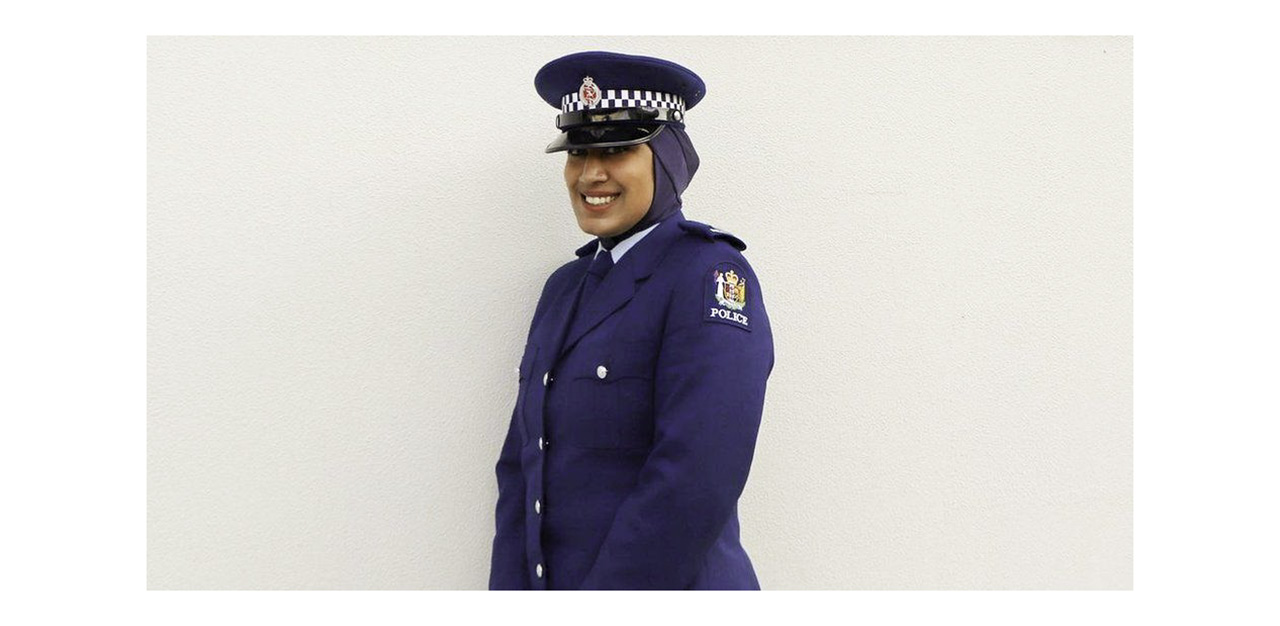
On whether the ‘ban’ should be lifted for other uniformed public service jobs
Lepak Conversations: We personally believe that other uniformed officers should be allowed to don the tudung as well. However, we understand that there may be other operational and safety concerns which the Government needs to consider before allowing the donning of the tudung in those professions.
We know that lasting change, change that some people may have difficulty with, requires some time. So we think it is a good thing that the Government takes a step-by-step approach and allows for the donning of the tudung for other uniformed officers after we have learnt to address the concerns people have about the change in policy for nurses.
On why Malay/Muslim women might still be wary about speaking up
Lepak Conversations: We do not really have an answer for this. We can’t speak for other women, or for the media outlets who have chosen not to feature these voices. However, personally for us, we know that there are many considerations that we have to take into account before speaking out. It may affect our personal lives, job opportunities etc, and we often have to consider the impact that our words will have on the community and how it will affect the way others perceive the community. We are not sure of any actual repercussions. But based on our limited interactions with some women, some of them do not speak out in fear of losing their jobs.
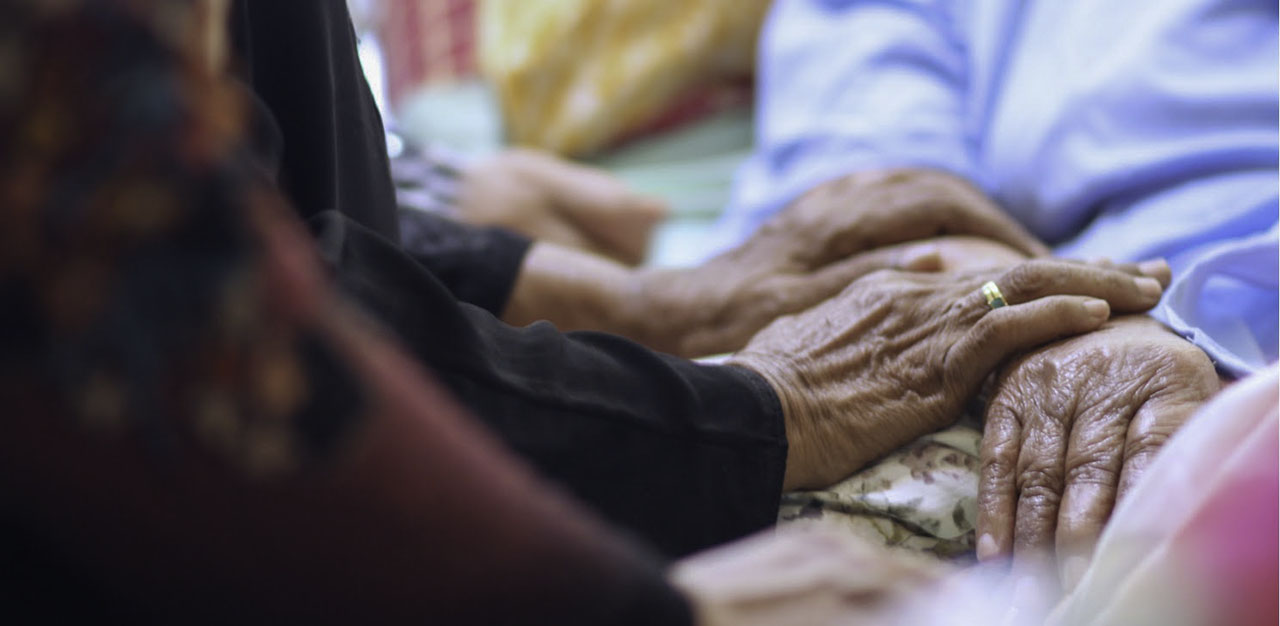
On personal experiences wearing the tudung
Lepak Conversations: Personally, we are both in professions that allow for the donning of the tudung. Anna is a graphic designer, and Nur is a law student, soon-to-be lawyer.
However, Nur’s mum who recently retired, was a nurse for over 30 years and could not don the tudung. Nur’s sister who works in a private security company is also not allowed to don the tudung while on the job.
Nur: I have personally been judged based on my tudung, and rejected for an internship. Unfortunately due to a number of reasons, I simply dusted myself off, reminded myself that my tudung does not define my abilities or hinder me in any way, and I had to move on from it.
Anna: I have heard stories from my mother about how she was told at job interviews that she would not be able to don the tudung, and this influenced her decision not to take up the job. It limited her choices and job opportunities.
And of course, from Lepak Conversations we have heard about many of such instances. We have compiled these stories in the highlights of our Instagram page so that everyone can read about the lived experiences of tudung-wearing women.
On maintaining secularist practices and neutrality within uniformed public services
Lepak Conversations: In the context of Singapore’s multireligious society, there is a false dichotomy between secularism and religious practices. Both can and have existed together for the longest time in Singapore. Singapore has always positioned itself as a secular country that will allow for religious practices to the maximum extent, as long as it does not threaten public order, public health or morality. Singapore has allowed for religious practices like Terawih prayers at void decks and Thaipusam processions on the streets, allowed for a separate Syariah system for divorce and inheritance matters, and allowed for daily religious practices like burning of incense and offerings for the Hungry Ghost Festival in common spaces.
As such, we are unclear as to why the donning of the tudung at the workplace, “a common space”, is disallowed on the basis of secularism.
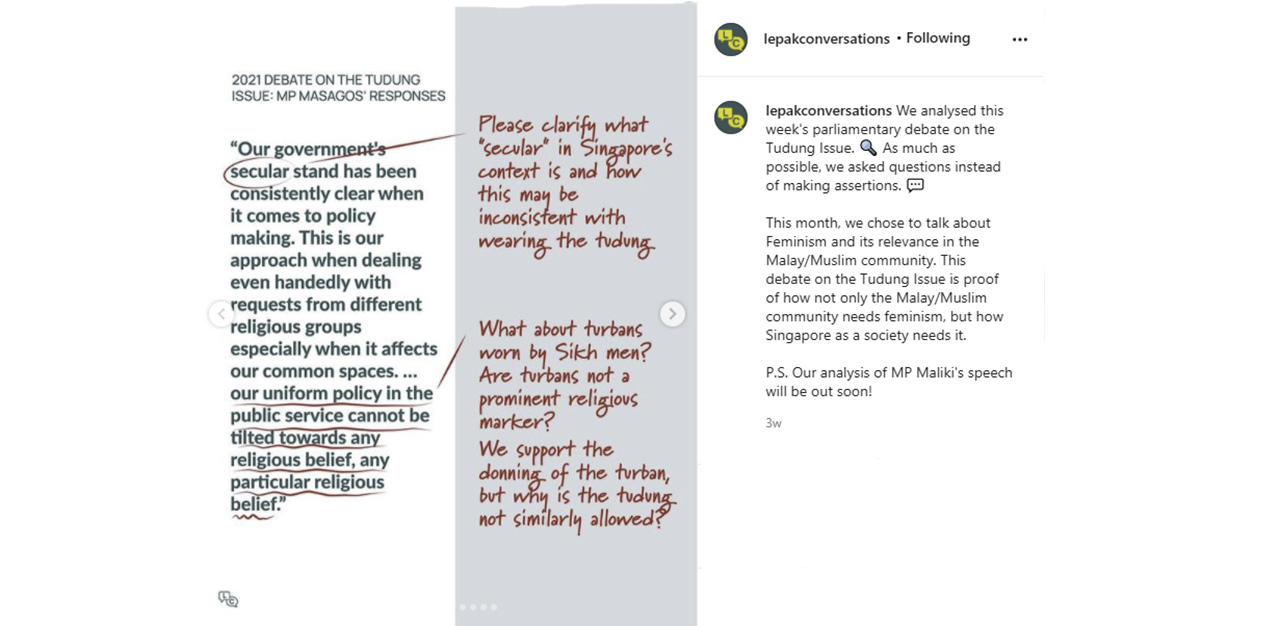
On next steps
Lepak Conversations: We believe the next step should be education on why the tudung is significant to Muslim women and what it represents. Perhaps with greater understanding, it could lead to acceptance across all communities. And this may satiate the Government’s concerns surrounding discriminatory behaviour against nurses.
We also believe that much more can be done in the private sector. Currently, we have the Tripartite Alliance for Fair Employment Practices guidelines, with guidelines against discrimination on the basis of race and religion. However, we do believe that more specific guidelines on discrimination on the basis of religious garments or items should be laid out. For instance, companies should be required to prove that there are legitimate safety or operational concerns for disallowing the use of a religious garment or item. The fact of the matter is that there are many Muslim women who are turned down for a job, or have to turn down a job offer, because the tudung is not allowed on the job. Harsher penalties should also be put in place for those who breach these guidelines.
On what sort of society we want to build
Lepak Conversations: For us, we want to build a society that is inclusive, compassionate, accepting of others’ religious beliefs and practices, and supportive of others’ personal choices. This is something that we should aspire towards. We see this being achieved through open, respectful, and constructive discussions, and education.
Join the conversations on THG’s Facebook and Instagram, and get the latest updates via Telegram.



